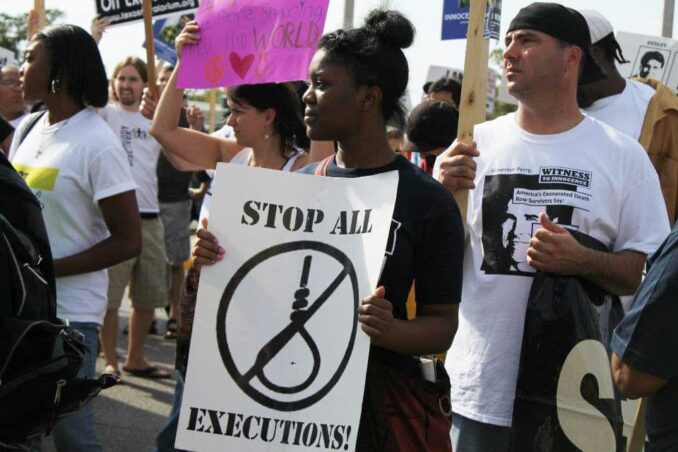Activists ‘march’ to abolish Texas death penalty
By Workers World Houston bureau
Houston, Texas
Though virtual for a second year due to the pandemic, the 22nd Annual March and Rally to Abolish the Death Penalty on Dec. 4 in Texas kept the fighting spirit alive here in the killing capital of the U.S.

Demonstrators at Texas annual march in 2011
Host Mirinda Crissman, member of the Texas Death Penalty Abolition Movement and co-chair of the Prisoners Solidarity Committee of Workers World Party, kicked off the rally by explaining that Texas has “executed more people in the modern era than the next six U.S. states combined. That is 573 people since 1982 legally lynched by Texas. The state that has executed the second largest number of people in the modern era is Virginia, with 113 executions.”
Crissman continued: “In 2020 Virginia was the first former Confederate state to abolish the death penalty, a big deal as legal lynchings have historically been concentrated in the southern U.S. Currently, there are 23 states with no death penalty, three with governor-imposed moratoriums and 24 states that have the death penalty. Public support for capital punishment is down, thanks in great part to activists all over the world collectively fighting its inhumanity for decades.
“The death penalty evolved from the rope to the chair to the needle. On this continent, it evolved directly from Indigenous genocide and enslavement of African people on stolen Indigenous land. The death penalty persists despite not deterring crime and despite the racist legal system getting fatal verdicts wrong so often.”
The virtual rally featured the words of two women who have lived the horror of death row and survived. Sabrina Butler-Smith was a loving teenage mother when she was wrongfully convicted in the death of her 9-month-old son in Mississippi, who passed away due to a genetic condition. Later exonerated of all wrongdoing, she spent six-and-a-half years incarcerated, two of those years on death row.
Butler-Smith talked about how often the injustice system doesn’t give a fair opportunity to those who are innocent to prove their innocence. She emphasized the system traumatizes not only the person facing down execution, but their families as well.
Pam Perillo, a survivor of Texas’ death row who came two days close to her execution, spoke. She was in prison for 39 years and has been home almost three, adjusting to living on her own in newfound freedom. She told of having her friends executed, including Frances Newton, legally lynched by Texas in September 2005.
Other speakers were Delia Perez-Meyer and Nadine Broxton, activists with loved ones on death row in Texas. The event included cultural elements like the upbeat music of the Free Radicals, as well as beautiful vocals from 6-year-old Marilyn Santoyo, who had met many of the abolitionists while singing outside the Huntsville death house during execution protests. Sister Mama Sonya — a Houston native and resident of Harris County, where record numbers of death sentences have been issued — delivered powerful poetry in opposition to the legal lynchings.
The event featured a report on the defense of Melissa Lucio, whose appeals have been exhausted and who will likely be getting an execution date at any moment. Adrienne Larimer, a clinical teaching fellow in the Cornell Center on the Death Penalty Worldwide, is defending Lucio by presenting her case before the Inter-American Commission on Human Rights.
Larimer will argue that Lucio is innocent of the crime she is charged with, that she faced horrendous gender-based violence as a child bride and that she endured ongoing abuse thereafter in her life. These circumstances led to her wrongful incarceration for what was an accidental death, when her 2-year-old daughter fell down stairs.
As the Nov. 5, 2020, Workers World reported: “From the notoriously racist Texas Rangers, to the aggressive and demeaning Harlingen police detectives, to the career-climbing court-appointed attorney, to the incompetent medical examiner, to the district attorney now in federal prison, to the trial judge — not one single person cared that Melissa was innocent or tried to find out what really happened to her child.”
French-American film director and journalist, Sabrina Van Tassel, who directed “The State of Texas vs. Melissa,” spoke to the particular horrors of the active harm done to Lucio by the unjust capital punishment system.
The group organizing the annual Texas abolition event was composed of majority women and gender-oppressed people stretching across multiple continents. Even from within the “belly of the beast,” these abolitionists remain dedicated to fighting the racist, sexist, anti-poor and ableist death-making apparatus. Abolish the death penalty!
Photo Credit: Texas Death Penalty Abolition Movement

